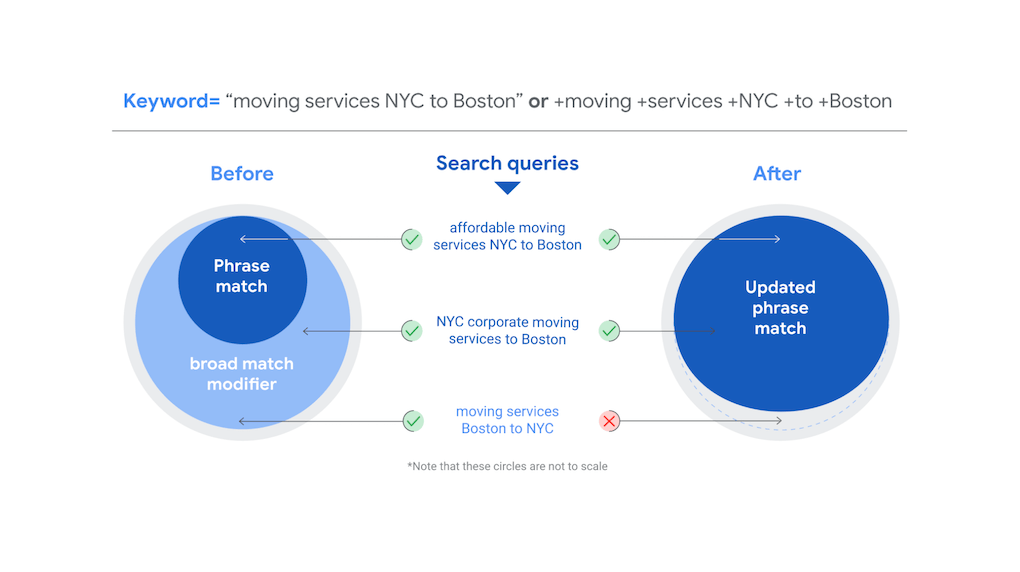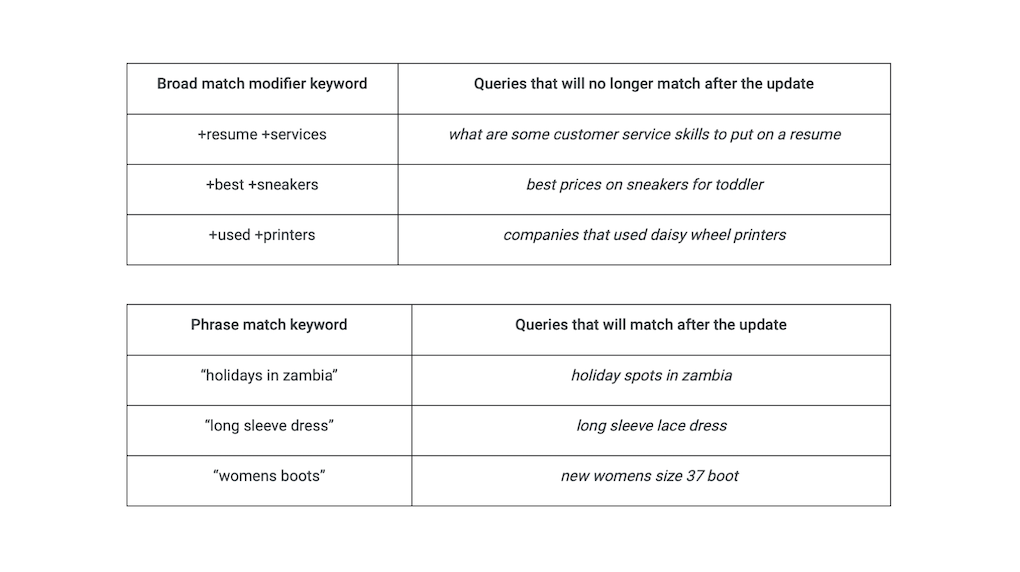Google Ads recently made a big announcement that will affect your business’s paid search results (and soon, too — users can expect changes as early as this month). Google is changing the matching behaviors of phrase match and broad match modifier (BMM) keywords. Google’s AI can now better understand search queries’ intent thanks to its technology progression. This progression means Google Ads is becoming more intuitive, which is good news for your campaigns. Here’s why:
How Google Ads Match Types Currently Work
Currently, the match types behave as follows:
Broad match: Used to cast a wide net. Here your ad will show whenever the keyword is present anywhere in the search query. Related searches will also match up.
Broad match modifier: Will capture queries containing the modified term (along with some of its synonyms and close variations) in any word order.
Phrase match: Will capture queries matching up to the phrase and close variations of that phrase, usually the order matters.
Exact match: Geared for more precise results. Your ad only appears when the exact keywords (along with close variations) are searched.
In short: There have been previous updates to match types so that they are less restrictive. For exact match, the inclusion and exclusion of function words was added. A query would also match up if it had a different word order but the same meaning. For phrase and broad match, close variants were added.
What is the New Google Ads Update?
Since Google has improved significantly at understanding intent, keywords will be focused on matching to the meaning of search. This focus will be applied to both phrase match and BMM. With this update, phrase match will take on the qualities of BMM. This means moving forward, you don’t need to decide between adding phrase match or BMM or adding both, you only need to add phrase match. With this simplified selection of match types from Google, your keyword list can be shortened, providing you with a more efficient set of keywords.
For accounts already using mostly phrase match keywords, you should expect to see more traffic as your phrase match keywords begin matching up to searches that used to only match up to BMM.

When Does the Update Take Effect?
Expect to begin seeing changes soon! The new update is rolling out in February 2021 for much of the world. English, German, Spanish, French, Italian, Dutch, Portuguese, and Russian language versions of Google Ads will be the first to experience the change. For these languages, you can expect to see the end of support for BMM by July 2021. Other Google Ads languages will soon follow with the same update later in 2021.
This means that you should begin updating your keyword approach now to align with this change.
What’s the Difference in Keyword Matching?
Here are three important differences to recognize in this Google Ads update:
- Phrase and BMM keywords will now match with searches in the same way.
Example: Before: a query for “looking for a floral patterned raincoat.” would not match up to the phrase match keyword “floral raincoat” but would match up to the BMM keyword +floral +raincoat Now: The query will match up to both match types
- Your ad may appear in searches that include your keyword’s meaning (thank you, Google AI).
- This new matching considers word order when relevant, making it more useful in understanding and matching queries to keywords. This means your ad won’t appear in cases when the search words are reversed and the meaning changes.
Below are more examples to illustrate how matching behavior will change after this update:

How Will The Update Change the Way I Choose Keywords?
You’ll still be able to use and add BMM until July, but making the switch now makes good marketing sense. To get started, here are a few steps to take:
- Add phrase match keywords moving forward, rather than BMM.
- Look for tools to come in the spring of 2021 that will help convert old BMM keywords to phrase match.
- Remove or pause newly redundant keywords, e.g. if you have both a phrase match and BMM of a keyword, keep the phrase match.
- Monitor your ad campaign performances and adjust bids and budgets based on new traffic patterns.
- Monitor search queries and add new negatives to block out any new irrelevant traffic.
- A decrease in traffic may happen for ads that relied heavily on BMM. To counter this, utilize Google’s “Add new keywords” recommendation and Keyword Planner.
Current BMM keywords will continue to work with Google’s updated matching behavior after the update. A migration is not required and you don’t need to stress about losing any data. The phase-out of BMM means you can now take advantage of the precision of phrase matching while, thanks to the smarts of Google’s AI, expanding your ad reach.